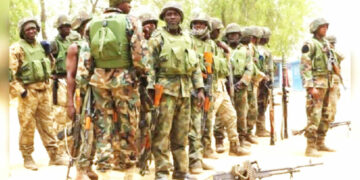Nigeria will today mark her 62nd Independence anniversary. The country gained its independence from the British colonialists on October1, 1960. Under normal circumstances, 62 years in the life of any nation ought to be a milestone. And it is not different for Nigeria.
Within that period, Nigeria has experienced some challenges and gains. We recall that barely six years after becoming self-governing sovereign nation, the country was plunged into a civil war from 1967 to 1970. The country has since moved on, unlike some other countries that experienced civil wars and have remained on their knees long after.
Nigeria has also experienced years of military rule which some political analysts blame for the underdevelopment of the country. Therefore, one of the major achievements in recent years is the sustenance of 23 years of unbroken democracy. For this newspaper, that in itself, is a feat that cannot be ignored in the nation’s contemporary history.
Within that period, also, it is unarguable that Nigeria has not taken advantage of her full potential and the reasons are not far to seek. Without mincing words, corruption, nepotism, and religious bigotry, just to mention a few, are at the root of the country’s underdevelopment. Sadly, countries like Singapore and Malaysia which gained independence after Nigeria are far ahead of the country on every index of development.
The underdevelopment as a country has visibly manifested in so many ways and posed numerous challenges to the citizen. Since 1960, the perennial power problem has been intractable. The country has not been able to successfully wean itself from overdependence on oil. After the discovery of oil, agriculture and other sectors of the economy with great potential for high foreign exchange earnings and domestic sustainability were abandoned.
The consequence is that poverty paradoxically still abounds amid plenty. According to a 2018 report by the World Poverty Index, 86.9 Nigerians are living in extreme poverty, a development that has earned the country the poverty capital of the world
Sadly, insecurity has also been an albatross. Rather than abate, this ugly phenomenon has continued to multiply in different forms. From kidnapping to armed robbery, we have graduated to a fully terrorised country, courtesy of Boko Haram and armed bandits. A new report, the Global Terrorism Index (GTI) has ranked Nigeria the third terrorism most impacted country in the world. Only Afghanistan and Iraq which ranked first and second respectively are ahead of Nigeria as countries that suffered most from terrorism. We recall that the Boko Haram insurgency, in particular, put the country on the global map of terrorism.
As the Boko Haram insurgency was waning in the northeast, banditry reared its ugly head in the northwest and north central. Thousands of Nigerians have been killed and kidnapped because of this ugly malaise. Regrettably, one major impediment to the growth and development of the country has been the thorny issue of ethnicity and religion. Most Nigerians first see themselves as Hausa, Fulani, Yoruba, or Igbo, not as Nigerian. Nigeria has not been able to achieve nationhood and unity in 62 years in the real sense of it. This should not be so.
After 62 years of attaining independence, most Nigerians are still obsessed with the ethnic affiliation and religion of the occupier of the office of president of the country. Instead of grooming citizens and statesmen, what we have in abundance in the country today are tribesmen. That is why the nation’s political culture will continue to be overshadowed by creed and tongue which have not benefitted us much. It is time for Nigeria to search for its leaders beyond the walls of churches and mosques and devoid of ethnicity.
In our considered opinion, as we enter the second gear of the political campaigns to decide who will lead the country in 2023, we call on Nigerians to put the country first. We have reiterated severally that politicians should stick to issues in the campaigns and avoid exploiting existing fault lines of ethnicity and religion.
Nigeria has also been a superstar in the corruption index. Unfortunately, efforts to reduce or eliminate it have been met with stiff resistance. With the vigour the current administration has put into fighting this ugly menace, one would have expected the monster to have been decapitated by now but that seems not to be the case.
Still, another major problem that has also been blamed for the slow pace of growth and development is leadership. It is incontestable that the country has a gross deficit of visionary leaders at all levels and so has been stuck in the developing countries’ stage for 62years. This is unacceptable and we must do everything possible to get out of this mud. To achieve our full potential as a nation, accountable, visionary, and purposeful leadership at all levels is sine qua non.
However, it has not been doom and gloom as some considerable progress has, no doubt, been made. Despite the challenges, the country has managed to remain as one in spite of agitations and threats of secessions. Consequently, and as Nigerians celebrate 62 years of independence, we call on President Muhammadu Buhari, in this last lap of his administration to put the country on a sound footing politically and economically.





